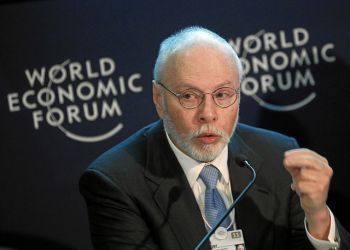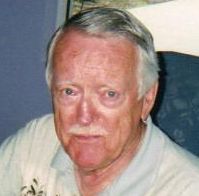
Publisher:
Bonnie King
CONTACT:
Newsroom@Salem-news.com
Advertising:
Adsales@Salem-news.com

~Truth~
~Justice~
~Peace~
TJP
Apr-16-2012 15:02

 TweetFollow @OregonNews
TweetFollow @OregonNews
American Logo: A series... Unsung American Heroes
Bill Annett Salem-News.comRichard III was king of England, and there he has the advantage over me. But he was a hunchback, and there I have the advantage over him. - Mark Twain
 Paul Singer photo courtesy: flickr.com |
(SASKATCHEWAN) - (We've noted it before, but here in America we're fixated on heroes, perhaps because as a nation we've never had a king, or an emperor, a titan or a man-god, although Teddy Roosevelt came close. Thus, manque, we tend to anoint with the hero title football players, olive drab draftees and slovenly musicians. Even when we do get it right and hero-worship somebody who richly deserve the title, we tend to honor the obvious, the headliners, the outstanding celebrities in war, peace and politics. But there is another quiet group of heroes – those who work unobtrusively behind the scene, far from the madding crowd, who are so rarely recognized, and yet who often, without our being aware, majorly do for all of us a kick-ass job. Let us now, therefore, sing about the unsung, the American heroes that we salute and celebrate, beginning with this issue. -Ed)
Paul Singer: Of Thee We Sing
Paul Singer is the prototype all-American boy. He was born in Tenafly, New Jersey, where his father was a pharmacist. By college age, he had already become an advocate for the common people by majoring in psychology at the University of Rochester. He went on to hone his skills as a champion of the underdog when he graduated from Harvard Law, and then devoted himself to a life of selfless service when he joined a Wall Street house.
The constraints of such a dedicated life of service could not hold him for long and, reaching for wider horizons, and at the same time borrowing something like $1.5 million from friends and relatives, he launched the enterprise that bore his middle name, Elliott & Associates, side-stepping the use of his real name, just in case the show should fail to stay on the road. Long before others had had gauged the potential, he caught the vision of what hedge funds could do for the poor and the otherwise employed, including himself.
Elliott & Associates is a hedge fund. It's mission statement is simple: make money. To date, that totals about $20 billion, after paying back the 1.5 mill. Give or take. Mostly take, since the firm's specialty is buying distressed assets – those of insolvent companies, widows and orphans and helplessly spreadeagled bankrupt countries, third world, if possible, because they can't afford competent legal counsel. One lick-smacking example, that of Argentina, currently is on the firm's books, potentially worth about two billion (U.S.) which he and a clutch of lawyers claim is owed Elliott by poor broke Argentina, in return for substantial investment, what might be called financial evangelism, or missionary work.
With a hedge fund like Elliott & Associates, the deal is you never have to say you're sorry, because you invest in anything but a sure thing and then hedge your bet. Sound familiar?
Of course. It sounds like Wall Street in the good old days in the twilight of the Bush Administration when unbridled greed was in flower. It smacks of the financial artistry of, and also sounds like, Bain Capital, the private equity firm run by that other homme du peuple, Mitt Romney. In fact, President-elect Romney, emerging recently flushed with success as Rick Santorum decided that doing a bunk before losing Pennsylvania could pay off in 2016.
Romney, the last man standing in the gallery of eight candidates for the Republican nomination. And like Elliott, Bain Capital's primary purpose according to its founder, was to provide jobs for working stiffs, whose vote is as good as anybody else's. The main difference is that Elliott is much bigger and will probably be providing scads of jobs for Argentinians, such as employment as leaf-blowers or flipping hamburgers for El McDonald.
And the comparison isn't an idle one, because recently it was announced that Paul Singer, the all time champion of winner-backers, with all that dough to prove it, was backing Mitt Romney with a million bucks or so. It turns out that Bain has invested about a million in Elliott, so the Super Pac donation isn't totally a give-away. But we'll get back to that later. First, more about why we think Singer is an unsung hero.
The crimes of Wall Street have been revealed and dwelt upon ad nauseum, the subject of endless commentary. The criminal conspiracy – which has been the worst kept secret in history for more than four years - involved investment banks, brokers and traders, (and hedge funds) of which Goldman Sachs and Deutsche Bank were prominent among the more agile players. These mobsters (1) cobbled together a universe of individual home mortgages, some good, some bad, some outright trash, (2) bundled them as collateral behind “mortgage-backed securities,” a hybrid, hitherto unknown but scarcely credible investment instrument, (3) hired huge credit rating agencies with household names, such as Moody's and Standard & Poor's, to attest to the quality of this mountain of manure, and then (4) sold billions of dollars worth of this odoriferous inventory to the gape-mouthed public and even supposedly knowledgeable institutions.
But that was only the opening salvo in this criminal caper. Rather, it was the first of a three-act atrocity. Next, they simultaneously placed enormous bets AGAINST the success of the garbage they had just sold as investment-grade securities, by running up immense short positions, nailing still other individual and institutional suckers.
The crime STILL didn't end there. They made further billions by designing and concocting sophisticated new “products,” a favorite banking hyperbole, in the form of derivatives twice removed, such as Credit Default Swaps, in effect selling what amounted to massive insurance policies both for and against the likelihood of the mortgage-backed securities (a) surviving, or (b) defaulting. Enter, at this point, agile dancers such as Paul Silver and other hedge fund operators. For perhaps the first time in history, institutional sharpies were allowed, on a massive scale, not only to play both sides against the middle - which is routine enough on Wall Street - but to play the middle as well.
Elliott Capital was adept at playing all three corners – and beyond, using not only sick corporate situations but dyspeptic third world governments as well.
If you care to try this – or anything remotely approaching this – on a more modest scale in Las Vegas, where the regulators are not as patient and understanding as the SEC, you will likely have your kneecaps broken at a minimum, or more likely you will be deposited in a shallow grave in the desert just off Interstate 15.
But the government and financial apologists for what followed are in a way even more culpable than the criminals. The rationale for giving more billions to the thieves who extracted billions from the system, went something like this: “if we don't bail these poor guys out, our whole system might collapse.” In other words, declaring that it isn't really a crime to be a crook on Wall Street, it's more aptly described as sin, that wonderful Christian invention, because it is subject to infinite forgiveness.
First it's necessary to get rid of a seeming anomaly, in that picking winners among investment targets and picking political winners - at first glance - would appear to be at variance. For example, in 2008, Paul Singer picked and backed Rudy Giuliani, who barely cleared the starting gate, mush less make it through the first furlong. And now he seriously believes that Romney will inhabit the White House, with all the payback possibilities dear to the heart of any entrepreneur. For a proven winner, what's wrong with this picture?
That, sophisticated reader, shows how much you know about fund hedgers. The front-end bet is only the beginning. You've heard of the recent popular financial-crisis genre (because we just detailed it) known as Credit Default Swaps (CDS). You invest in some crap investment, and perhaps also sell it to clients, whom you convince it's Triple-A and next to godliness. Then you bet against its success (using a CDS), in other words in effect betting that it will tank. Like the undertaker in a western shoot-out, either way you win. But biggest on the downside.
So, while betting on old Rudy in '08, Elliott & Associates most likely had the bet laid off on everybody in the shop, even a substantial deposit on Obama. Similarly, the measly million bucks he's got on Romney's handsome proboscis is not only peanuts for a $20 billion dollar organization but he, Singer, is probably singing a different tune by buying EDSs like crazy. (That's Election Default Swaps, a term I just invented, but I'm sure exists.)
So the secret of Paul Singer's success is twofold: betting on winners, modestly, and contrapuntally putting the real honey bee chips on losers, and then betting even more on their flip side.
It must be true. He's made 20 billion with that formula. And wouldn't it be a riot if Romney was suckered into having confidence in a game that he's tried to emulate but is a much bigger show, which is – by all indications – run by a guy who is indeed, at least on the right side of the aisle, a national hero?
 Bill Annett grew up a writing brat; his father, Ross Annett, at a time when Scott Fitzgerald and P.G. Wodehouse were regular contributors, wrote the longest series of short stories in the Saturday Evening Post's history, with the sole exception of the unsinkable Tugboat Annie.
Bill Annett grew up a writing brat; his father, Ross Annett, at a time when Scott Fitzgerald and P.G. Wodehouse were regular contributors, wrote the longest series of short stories in the Saturday Evening Post's history, with the sole exception of the unsinkable Tugboat Annie.
At 18, Bill's first short story was included in the anthology “Canadian Short Stories.” Alarmed, his father enrolled Bill in law school in Manitoba to ensure his going straight. For a time, it worked, although Bill did an arabesque into an English major, followed, logically, by corporation finance, investment banking and business administration at NYU and the Wharton School. He added G.I. education in the Army's CID at Fort Dix, New Jersey during the Korean altercation.
He also contributed to The American Banker and Venture in New York, INC. in Boston, the International Mining Journal in London, Hong Kong Business, Financial Times and Financial Post in Toronto.
Bill has written six books, including a page-turner on mutual funds, a send-up on the securities industry, three corporate histories and a novel, the latter no doubt inspired by his current occupation in Daytona Beach as a law-abiding beach comber.
You can write to Bill Annett at this address: bilko23@gmail.com
Articles for April 15, 2012 | Articles for April 16, 2012 | Articles for April 17, 2012

Salem-News.com:

Quick Links
DINING
Willamette UniversityGoudy Commons Cafe
Dine on the Queen
Willamette Queen Sternwheeler
MUST SEE SALEM
Oregon Capitol ToursCapitol History Gateway
Willamette River Ride
Willamette Queen Sternwheeler
Historic Home Tours:
Deepwood Museum
The Bush House
Gaiety Hollow Garden
AUCTIONS - APPRAISALS
Auction Masters & AppraisalsCONSTRUCTION SERVICES
Roofing and ContractingSheridan, Ore.
ONLINE SHOPPING
Special Occasion DressesAdvertise with Salem-News
Contact:AdSales@Salem-News.com


Terms of Service | Privacy Policy
All comments and messages are approved by people and self promotional links or unacceptable comments are denied.
[Return to Top]
©2025 Salem-News.com. All opinions expressed in this article are those of the author and do not necessarily reflect those of Salem-News.com.